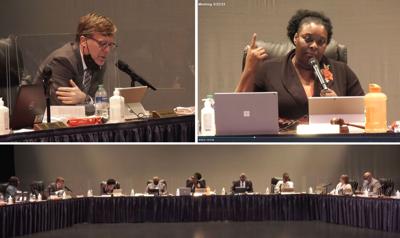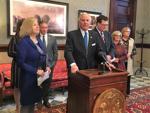We’d love to believe that a bizarre incident last week at a Midlands school board meeting was an anomalous instance of a rogue chairwoman drunk with power and angry over a news report about out-of-control spending in her district.
Unfortunately, we suspect this was not quite as far outside the norm as we hope. And even if Cheryl Harris’ delusional claim that she could bar her fellow board members from criticizing her or the district was a first, the general idea it flows from is one that’s widely adopted by school boards across South Carolina.
As The Post and Courier’s Avery Wilks discovered, the S.C. School Boards Association recommends that these boards adopt a policy like Richland One's that names the chair as the official board spokesperson and that says board members “may refer the information seekers to the board chair or the superintendent’s designee.” That doesn’t gag anyone, but since that’s something they obviously don’t need permission to do, it’s hard to see such policies as anything other than an attempt to encourage board members to keep quiet.
Actually, the association's language is stronger, saying board members "will" refer inquiries to the board chair, which association Director Scott Price told us was aimed at routine information about board votes and such. He told Mr. Wilks further that it was designed to help school districts present “a consistent message” and encourage board members to rally around whatever decision a board makes, even if they voted against it.
We can understand the need to make sure correct information is distributed about, say, which policies were approved and by what vote. But the text of that policy has morphed in the minds of too many members of school boards and other governing bodies to mean they can’t answer questions from the public or the media about their decisions because only the board chair to do so. There’s been a disturbing uptick lately in appointed and even elected officials using that idea as a dodge to avoid answering for controversial decisions and problems. More disturbingly, a growing number of board members seem to believe it’s true.
And while it’s counterproductive for board members to refuse to accept that they lost a vote and to keep bringing up the same issue over and over at board meetings, the idea that they should not express their concerns does a tremendous disservice to the voters, and potentially to the institution they govern.
The policy of school boards and other governing bodies — particularly elected bodies — should be just the opposite: to encourage board members to answer questions from the public and the media about what the board has done, what it’s contemplating and why. It’s not only their right but their obligation to answer such questions.
Imagine, for instance, if the state Senate adopted a policy that suggests individual senators refer questions to the president of the Senate — a senator who presides over sessions but represents no more South Carolinians than any of the other senators. Imagine further that the policy encourages individual senators to pretend they support all the bills the Senate passes, rather than explaining their concerns. If your senator followed that policy, how would you be able to assess the job he's doing and whether he should be reelected?
As concerning as the current policy is, the Richland One board gave initial approval on March 22 to making the bad policy worse, by adding more model language that says board members who do speak publicly “shall state that their comments are not stated on behalf of the school board but they are individual comments made by the board member.”
In addition to being silly — obviously they're speaking for themselves — that raises constitutional questions. (Dictating what elected officials can and can't say is an entirely different thing than an organization telling employees what they can and can't say in order to keep their jobs.) Yet even that's tame compared to Ms. Harris’ public explanation of the policy: that it prohibits anyone on the board except for her from criticizing the board or the district or school board members.
To state the painfully obvious, that's not only megalomaniacal but also violates school board members’ constitutional right to free speech. And it provides the best illustration we could have imagined of why it was such a bad idea for the board to designate Ms. Harris as its spokeswoman. It also illustrates the mindset we’ve seen far too many times on school boards, local governing boards and even state commissions.
You can’t write a law that requires elected officials to explain what they did or why they did it — that’s just as much a constitutional problem as trying to prohibit them from doing so. But governing bodies certainly can and should adopt policies that encourage rather than discourage members to be both proactive and responsive to public inquiries about their actions and their reasoning for taking those actions. And voters can and should make it clear that we expect that from our elected officials.












